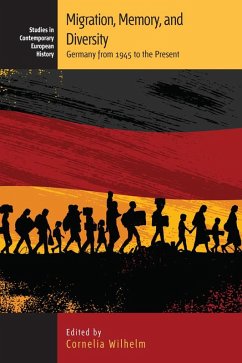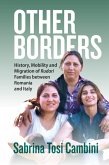Migration, Memory, and Diversity (eBook, PDF)
Germany from 1945 to the Present
Redaktion: Wilhelm, Cornelia
32,95 €
32,95 €
inkl. MwSt.
Sofort per Download lieferbar

16 °P sammeln
32,95 €
Als Download kaufen

32,95 €
inkl. MwSt.
Sofort per Download lieferbar

16 °P sammeln
Jetzt verschenken
Alle Infos zum eBook verschenken
32,95 €
inkl. MwSt.
Sofort per Download lieferbar
Alle Infos zum eBook verschenken

16 °P sammeln
Migration, Memory, and Diversity (eBook, PDF)
Germany from 1945 to the Present
Redaktion: Wilhelm, Cornelia
- Format: PDF
- Merkliste
- Auf die Merkliste
- Bewerten Bewerten
- Teilen
- Produkt teilen
- Produkterinnerung
- Produkterinnerung

Bitte loggen Sie sich zunächst in Ihr Kundenkonto ein oder registrieren Sie sich bei
bücher.de, um das eBook-Abo tolino select nutzen zu können.
Hier können Sie sich einloggen
Hier können Sie sich einloggen
Sie sind bereits eingeloggt. Klicken Sie auf 2. tolino select Abo, um fortzufahren.

Bitte loggen Sie sich zunächst in Ihr Kundenkonto ein oder registrieren Sie sich bei bücher.de, um das eBook-Abo tolino select nutzen zu können.
Within Germany, policies and cultural attitudes toward migrants have been profoundly shaped by the difficult legacies of the Second World War and its aftermath. This wide-ranging volume explores the complex history of migration and diversity in Germany from 1945 to today, showing how conceptions of "otherness" developed while memories of the Nazi era were still fresh, and identifying the continuities and transformations they exhibited through the Cold War and reunification. It provides invaluable context for understanding contemporary Germany's unique role within regional politics at a time…mehr
- Geräte: PC
- mit Kopierschutz
- eBook Hilfe
- Größe: 1.75MB
Andere Kunden interessierten sich auch für
![Representing 21st-Century Migration in Europe (eBook, PDF) Representing 21st-Century Migration in Europe (eBook, PDF)]() Representing 21st-Century Migration in Europe (eBook, PDF)28,95 €
Representing 21st-Century Migration in Europe (eBook, PDF)28,95 €![Memory, Trauma, and Identity (eBook, PDF) Memory, Trauma, and Identity (eBook, PDF)]() Ron EyermanMemory, Trauma, and Identity (eBook, PDF)73,95 €
Ron EyermanMemory, Trauma, and Identity (eBook, PDF)73,95 €![Hotbeds of Licentiousness (eBook, PDF) Hotbeds of Licentiousness (eBook, PDF)]() Benjamin HalliganHotbeds of Licentiousness (eBook, PDF)28,95 €
Benjamin HalliganHotbeds of Licentiousness (eBook, PDF)28,95 €![Cultures of Exile (eBook, PDF) Cultures of Exile (eBook, PDF)]() Cultures of Exile (eBook, PDF)28,95 €
Cultures of Exile (eBook, PDF)28,95 €![Demography and National Security (eBook, PDF) Demography and National Security (eBook, PDF)]() Demography and National Security (eBook, PDF)28,95 €
Demography and National Security (eBook, PDF)28,95 €![Immigrants and Bureaucrats (eBook, PDF) Immigrants and Bureaucrats (eBook, PDF)]() Esther HertzogImmigrants and Bureaucrats (eBook, PDF)28,95 €
Esther HertzogImmigrants and Bureaucrats (eBook, PDF)28,95 €![Other Borders (eBook, PDF) Other Borders (eBook, PDF)]() Sabrina Tosi CambiniOther Borders (eBook, PDF)28,95 €
Sabrina Tosi CambiniOther Borders (eBook, PDF)28,95 €-
-
-
Within Germany, policies and cultural attitudes toward migrants have been profoundly shaped by the difficult legacies of the Second World War and its aftermath. This wide-ranging volume explores the complex history of migration and diversity in Germany from 1945 to today, showing how conceptions of "otherness" developed while memories of the Nazi era were still fresh, and identifying the continuities and transformations they exhibited through the Cold War and reunification. It provides invaluable context for understanding contemporary Germany's unique role within regional politics at a time when an unprecedented influx of immigrants and refugees present the European community with a significant challenge.
Dieser Download kann aus rechtlichen Gründen nur mit Rechnungsadresse in A, D ausgeliefert werden.
Produktdetails
- Produktdetails
- Verlag: Berghahn Books
- Seitenzahl: 366
- Erscheinungstermin: 1. November 2016
- Englisch
- ISBN-13: 9781785333286
- Artikelnr.: 48052873
- Verlag: Berghahn Books
- Seitenzahl: 366
- Erscheinungstermin: 1. November 2016
- Englisch
- ISBN-13: 9781785333286
- Artikelnr.: 48052873
- Herstellerkennzeichnung Die Herstellerinformationen sind derzeit nicht verfügbar.
Cornelia Wilhelm is currently professor of modern history at Ludwig-Maximilians-Universität, Munich. From 2010 to 2016 she has been DAAD Visiting Professor in the Department of History and the Jewish Studies Program at Emory University in Atlanta and had also held visiting positions at Rutgers University, New Brunswick, and Leopold-Franzens-University of Innsbruck, Austria. She is author of Bewegung oder Verein? Nationalsozialistische Volkstumspokitik in den USA (1998); and Deutsche Juden in America: Bürgerliches Selbstbewusstsein und Jüdische Identität in den Orden B'nai B'rith und True Sisters (2007), also published in English translation (2011). She is currently working on an in-depth study on German refugee rabbis in the United States after 1933.
Acknowledgements Preface Konrad H. Jarausch Introduction: Migration, Memory, and Diversity in Germany after 1945 Cornelia Wilhelm PART I: POSTWAR MIGRATIONS: HISTORY, MEMORY, AND DIVERSITY Chapter 1. The Commemoration of Forced Migrations in Germany Martin Schulze-Wessel Chapter 2. A Missing Narrative: Displaced Persons in the History of Postwar
West Germany Anna Holian Chapter 3. Inclusion and Exclusion of Immigrants and the Politics of Labeling:
Thinking Beyond "Guest Workers," "Ethnic German Resettlers," "Refugees
of the European Crisis," and "Poverty Migration" Asiye Kaya Chapter 4. Refugee Reports: Asylum and Mass Media in Divided Germany during the
Cold War and Beyond Patrice G. Poutrus PART II: INSTITUTIONAL RESPONSES TO MIGRATION AND CULTURAL DIFFERENCE Chapter 5. History, Memory, and Symbolic Boundaries in the Federal Republic of
Germany: Migrants and Migration in School History Textbooks Simone Lässig Chapter 6. Representations of Immigration and Emigration in Germany's Historic
Museums Katharzyna Nogueira and Dietmar Osses Chapter 7. Archival Collections and the Study of Migration Klaus A. Lankheit Chapter 8. Thinking Difference in Postwar Germany: Some Epistemological Obstacles
around "Race" Rita Chin PART III: RECONSIDERING HISTORY, MEMORY, AND IDENTITY IN THE POSTUNIFICATION PERIOD Chapter 9. Nationalism and Citizenship during the Passage from the Postwar
to the Post-Postwar Dietmar Schirmer Chapter 10. Learning to Live with the Other Germany in the Post-Wall Federal Republic Kathrin Bower Chapter 11. Conflicting Memories, Conflicting Identities: Russian Jewish Immigration
and the Image of a New German Jewry Karen Körber Chapter 12. Swept Under the Rug: Home-grown Anti-Semitism and Migrants as
"Obstacles" in German Holocaust Remembrance Annette Seidel-Arpaci Afterword: Structures and Larger Context of Political Change in Migration and Integration Policy: Germany between Normalization and Europeanization Holger Kolb Index
West Germany Anna Holian Chapter 3. Inclusion and Exclusion of Immigrants and the Politics of Labeling:
Thinking Beyond "Guest Workers," "Ethnic German Resettlers," "Refugees
of the European Crisis," and "Poverty Migration" Asiye Kaya Chapter 4. Refugee Reports: Asylum and Mass Media in Divided Germany during the
Cold War and Beyond Patrice G. Poutrus PART II: INSTITUTIONAL RESPONSES TO MIGRATION AND CULTURAL DIFFERENCE Chapter 5. History, Memory, and Symbolic Boundaries in the Federal Republic of
Germany: Migrants and Migration in School History Textbooks Simone Lässig Chapter 6. Representations of Immigration and Emigration in Germany's Historic
Museums Katharzyna Nogueira and Dietmar Osses Chapter 7. Archival Collections and the Study of Migration Klaus A. Lankheit Chapter 8. Thinking Difference in Postwar Germany: Some Epistemological Obstacles
around "Race" Rita Chin PART III: RECONSIDERING HISTORY, MEMORY, AND IDENTITY IN THE POSTUNIFICATION PERIOD Chapter 9. Nationalism and Citizenship during the Passage from the Postwar
to the Post-Postwar Dietmar Schirmer Chapter 10. Learning to Live with the Other Germany in the Post-Wall Federal Republic Kathrin Bower Chapter 11. Conflicting Memories, Conflicting Identities: Russian Jewish Immigration
and the Image of a New German Jewry Karen Körber Chapter 12. Swept Under the Rug: Home-grown Anti-Semitism and Migrants as
"Obstacles" in German Holocaust Remembrance Annette Seidel-Arpaci Afterword: Structures and Larger Context of Political Change in Migration and Integration Policy: Germany between Normalization and Europeanization Holger Kolb Index
Acknowledgements Preface Konrad H. Jarausch Introduction: Migration, Memory, and Diversity in Germany after 1945 Cornelia Wilhelm PART I: POSTWAR MIGRATIONS: HISTORY, MEMORY, AND DIVERSITY Chapter 1. The Commemoration of Forced Migrations in Germany Martin Schulze-Wessel Chapter 2. A Missing Narrative: Displaced Persons in the History of Postwar
West Germany Anna Holian Chapter 3. Inclusion and Exclusion of Immigrants and the Politics of Labeling:
Thinking Beyond "Guest Workers," "Ethnic German Resettlers," "Refugees
of the European Crisis," and "Poverty Migration" Asiye Kaya Chapter 4. Refugee Reports: Asylum and Mass Media in Divided Germany during the
Cold War and Beyond Patrice G. Poutrus PART II: INSTITUTIONAL RESPONSES TO MIGRATION AND CULTURAL DIFFERENCE Chapter 5. History, Memory, and Symbolic Boundaries in the Federal Republic of
Germany: Migrants and Migration in School History Textbooks Simone Lässig Chapter 6. Representations of Immigration and Emigration in Germany's Historic
Museums Katharzyna Nogueira and Dietmar Osses Chapter 7. Archival Collections and the Study of Migration Klaus A. Lankheit Chapter 8. Thinking Difference in Postwar Germany: Some Epistemological Obstacles
around "Race" Rita Chin PART III: RECONSIDERING HISTORY, MEMORY, AND IDENTITY IN THE POSTUNIFICATION PERIOD Chapter 9. Nationalism and Citizenship during the Passage from the Postwar
to the Post-Postwar Dietmar Schirmer Chapter 10. Learning to Live with the Other Germany in the Post-Wall Federal Republic Kathrin Bower Chapter 11. Conflicting Memories, Conflicting Identities: Russian Jewish Immigration
and the Image of a New German Jewry Karen Körber Chapter 12. Swept Under the Rug: Home-grown Anti-Semitism and Migrants as
"Obstacles" in German Holocaust Remembrance Annette Seidel-Arpaci Afterword: Structures and Larger Context of Political Change in Migration and Integration Policy: Germany between Normalization and Europeanization Holger Kolb Index
West Germany Anna Holian Chapter 3. Inclusion and Exclusion of Immigrants and the Politics of Labeling:
Thinking Beyond "Guest Workers," "Ethnic German Resettlers," "Refugees
of the European Crisis," and "Poverty Migration" Asiye Kaya Chapter 4. Refugee Reports: Asylum and Mass Media in Divided Germany during the
Cold War and Beyond Patrice G. Poutrus PART II: INSTITUTIONAL RESPONSES TO MIGRATION AND CULTURAL DIFFERENCE Chapter 5. History, Memory, and Symbolic Boundaries in the Federal Republic of
Germany: Migrants and Migration in School History Textbooks Simone Lässig Chapter 6. Representations of Immigration and Emigration in Germany's Historic
Museums Katharzyna Nogueira and Dietmar Osses Chapter 7. Archival Collections and the Study of Migration Klaus A. Lankheit Chapter 8. Thinking Difference in Postwar Germany: Some Epistemological Obstacles
around "Race" Rita Chin PART III: RECONSIDERING HISTORY, MEMORY, AND IDENTITY IN THE POSTUNIFICATION PERIOD Chapter 9. Nationalism and Citizenship during the Passage from the Postwar
to the Post-Postwar Dietmar Schirmer Chapter 10. Learning to Live with the Other Germany in the Post-Wall Federal Republic Kathrin Bower Chapter 11. Conflicting Memories, Conflicting Identities: Russian Jewish Immigration
and the Image of a New German Jewry Karen Körber Chapter 12. Swept Under the Rug: Home-grown Anti-Semitism and Migrants as
"Obstacles" in German Holocaust Remembrance Annette Seidel-Arpaci Afterword: Structures and Larger Context of Political Change in Migration and Integration Policy: Germany between Normalization and Europeanization Holger Kolb Index







